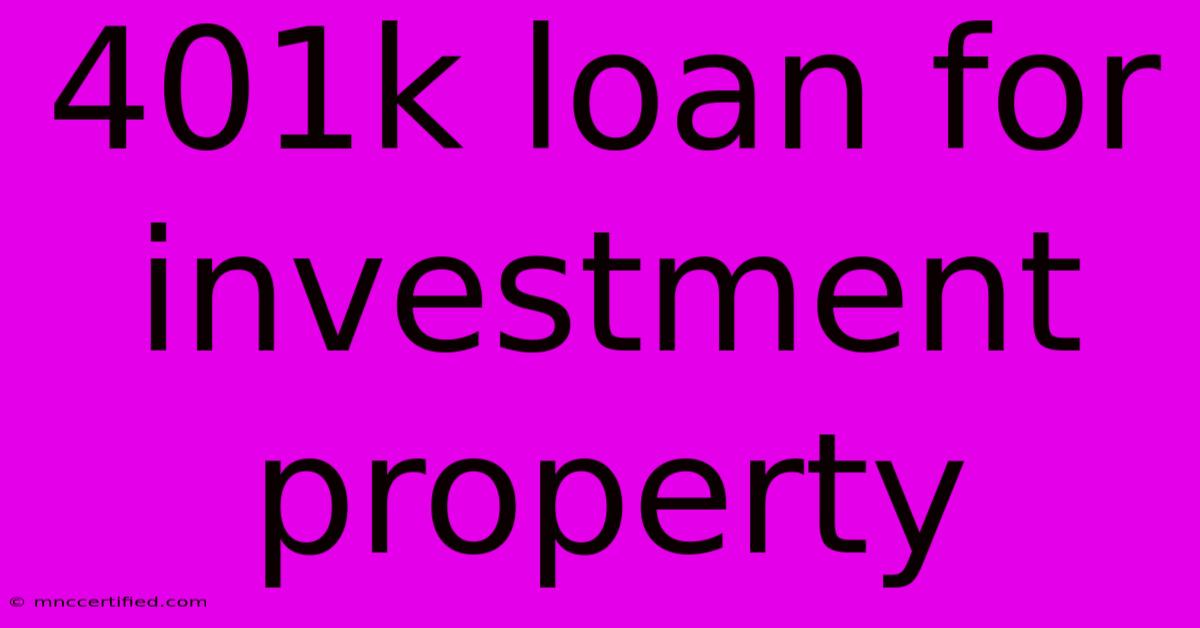401k Loan For Investment Property

Table of Contents
401(k) Loan for Investment Property: A Risky Gamble or Smart Strategy?
Taking out a 401(k) loan to invest in real estate can seem appealing. The prospect of leveraging tax-advantaged retirement savings to purchase an investment property is tempting, offering the potential for significant returns. However, it's a high-stakes decision with considerable risks. This article explores the advantages and disadvantages of using your 401(k) for an investment property, helping you decide if it's the right move for your financial situation.
Understanding 401(k) Loans
Before diving into the specifics of using a 401(k) loan for an investment property, let's clarify the basics. A 401(k) loan allows you to borrow money from your own retirement account. This loan is typically subject to certain stipulations, including:
- Loan limits: The maximum loan amount is usually capped at 50% of your vested balance, or a specific dollar amount, whichever is less.
- Interest rates: Interest rates are generally lower than conventional loans, as you're essentially borrowing from yourself. However, you're paying interest to your future self.
- Repayment terms: You'll typically have a set repayment period, usually between 5 and 10 years.
- Consequences of default: Failure to repay the loan can trigger significant tax penalties and negatively impact your retirement savings. This could lead to a taxable distribution and potentially a 10% early withdrawal penalty.
Advantages of Using a 401(k) Loan for Investment Property
While risky, a 401(k) loan for real estate investment can offer several potential benefits:
- Lower interest rates: As mentioned, the interest rate is often lower than a traditional mortgage, potentially saving you money on interest payments.
- Access to capital: It can provide access to capital you might not otherwise have, enabling you to invest in an investment property sooner.
- Tax-advantaged growth: While you're paying interest to yourself, the money remains within your 401(k), continuing to grow tax-deferred.
Disadvantages and Risks of Using a 401(k) Loan for Investment Property
The potential drawbacks are substantial and shouldn't be overlooked:
- High risk of default: If your investment property doesn't perform as expected (e.g., rental income falls short, property value decreases), you risk defaulting on the loan.
- Tax penalties and early withdrawal fees: Defaulting on a 401(k) loan leads to severe tax consequences, including significant tax penalties and potentially losing a substantial portion of your retirement savings.
- Impact on retirement savings: Diverting funds from your retirement account to an investment property significantly reduces your retirement nest egg. This risk increases exponentially if the real estate investment fails to perform as anticipated.
- Loss of liquidity: The borrowed funds are tied up in the investment property, making it difficult to access them for other emergencies or opportunities.
- Potential for job loss: If you lose your job, you might be required to repay the entire loan balance within a short timeframe, creating a significant financial burden.
Alternatives to 401(k) Loans for Investment Property
Before considering a 401(k) loan, explore alternative funding options:
- Traditional Mortgages: Explore traditional mortgages with competitive interest rates.
- Home Equity Loans or Lines of Credit: If you own your primary residence, consider leveraging its equity.
- Private Money Lending: Seek out private lenders or investors who may provide financing for real estate investments.
Conclusion: Weighing the Risks and Rewards
Using a 401(k) loan to purchase an investment property is a high-risk, high-reward strategy. While the potential for significant returns exists, the consequences of default are severe. Thoroughly assess your financial situation, risk tolerance, and the potential returns of the investment property before considering this option. Consult with a qualified financial advisor and real estate professional to get expert advice tailored to your circumstances. Only proceed if you understand the potential downsides and have a robust plan to mitigate the risks involved. Remember, your retirement savings are crucial for your future financial security; don't jeopardize it for a potentially risky investment.

Thank you for visiting our website wich cover about 401k Loan For Investment Property. We hope the information provided has been useful to you. Feel free to contact us if you have any questions or need further assistance. See you next time and dont miss to bookmark.
Featured Posts
-
Western Reserve Insurance Reviews
Nov 20, 2024
-
White Earth Investment Initiative
Nov 20, 2024
-
Fs Investments Portfolio Advisors
Nov 20, 2024
-
Invest Fest Atlanta 2024 Schedule
Nov 20, 2024
-
Is Fundrise Ipo A Good Investment
Nov 20, 2024